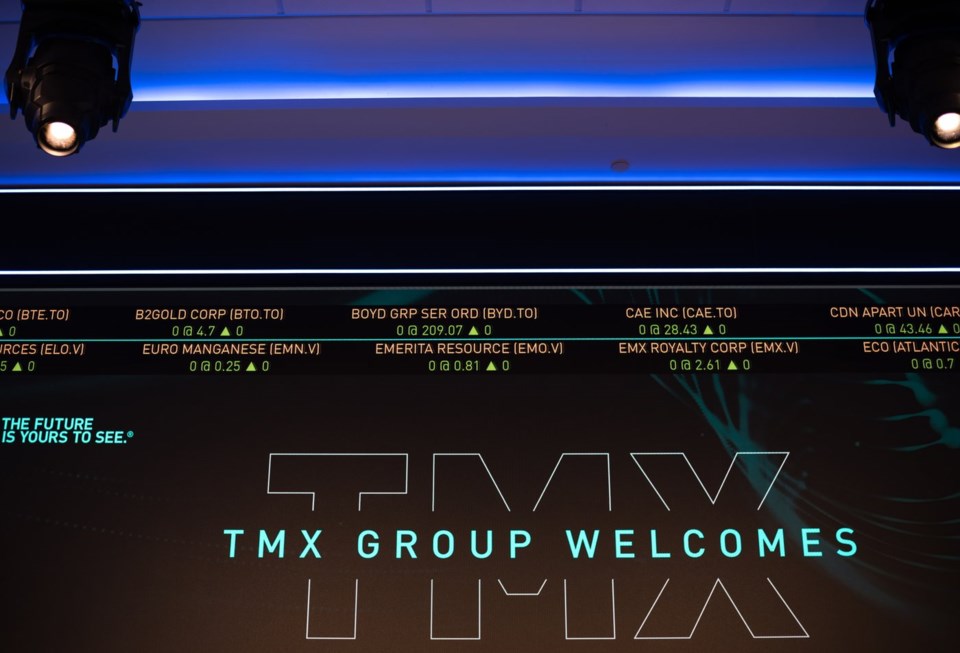Canada’s main stock index stayed nearly flat Wednesday as shares bobbed along in what one portfolio manager calls a “floating pattern.”
The S&P/TSX composite index crept up 5.42 points to 21,793.90 on the strength of the base metal and industrial sectors while weighed down by losses in energy and telecoms.
In New York, the Dow Jones industrial average was up 15.64 points at 39,127.80. The S&P 500 index nudged up 8.60 points to 5,477.90, while the Nasdaq composite climbed 87.50 points to 17,805.16.
In Canada, many stocks remain in limbo ahead of economic output data this Friday and corporate earnings results next month.
“It’s not really like we’re in a holding pattern — it’s more of a floating pattern,” said Stephen Duench, vice-president and portfolio manager for AGF Investments Inc. Holding patterns are steady, while floating suggests more ups and downs, he clarified.
“You’re just bobbing around and not really figuring out any real trend.”
Duench pointed to chipmaking giant Nvidia, which saw hundreds of billions of dollars wiped from its valuation in recent days, followed by a nearly eight per cent gain on Tuesday that boosted the Nasdaq.
“There’s no fundamental news on any of that,” Duench said. “A lot of stocks are acting like that … the day-to-day movements in these markets are very erratic.”
Energy marks one area where the tides seem to have risen and fallen in whimsical fashion at times.
“Energy was hot earlier in the year. In the last three months it really fell out of favour,” Duench said. Last week saw a rally amid high oil prices, followed by a slight loss Wednesday, “and nothing has changed fundamentally.”
The August crude oil contract rose seven cents at US$80.90 per barrel on Wednesday.
However, not all ebbs and flows are random.
Deutsche Bank revised its stance on Toronto-based First Quantum Minerals on Wednesday, boosting the stock rating to buy from hold and triggering a seven per cent bump in the share price that drove a base metal sector increase.
“The copper story has definitely caught the generalist investor’s attention, and obviously caught the attention of some global banks,” Duench said.
The equities markets continued to absorb news of higher-than-expected inflation on Tuesday, when Statistics Canada reported the annual rate rose to 2.9 per cent in May compared with 2.7 per cent in April.
Telecommunications companies, utilities outfits and real estate investment trusts (REITs) are all areas that would benefit more directly from lower rates, Duench pointed out.
“Their weakness today is a follow-through from the strong CPI (consumer price index) yesterday.”
Figures expected Friday on Canada’s gross domestic product could also move those markets. Should economic output lag behind projections, expectations for more cuts to the benchmark interest rate from the Bank of Canada over the next 18 months will likely rise even higher.
“They have been punished the last couple of days, and really the last few months and quarters, because of those interest rates,” Duenech said of telecoms, utilities and REITs.
Shares for Telus Corp. fell nearly two per cent Wednesday, the latest drop in a 19-percentage-point fall from 12 months ago. BCE Inc. saw shares remain steady after a 24 per cent decrease in the same period.
“Where we’re seeing a lot of pain is the telcos. We’re close to making a five-year low on a name like Telus. Bell has been a very large underperformer,” he said.
More broadly, the stock bobbing persists.
“This kind of floating pattern in the market is something that investors can be frustrated with sometimes, but it’s just the nature of the market when we’re in between earnings, in and around quarter end,” he said. The upcoming Canadian and U.S. national holidays may add to the stock stasis, he noted.
“This is the time where you kind of do your work and sharpen your pencil.”
The Canadian dollar traded for 73.01 cents US compared with 73.21 cents US on Tuesday.
The August natural gas contract was down 11 cents at US$2.75 per mmBTU.
The August gold contract was down US$17.60 at US$2,313.20 an ounce and the September copper contract stayed level at US$4.37 a pound.
This report by The Canadian Press was first published June 26, 2024.
Companies in this story: (TSX:GSPTSE, TSX:CADUSD)
Christopher Reynolds, The Canadian Press



